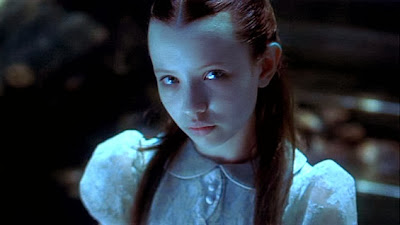The cycle of cheesy but artsy old horror film remakes that Dark Castle Entertainment initiated three years ago has finally descended to the bottom. And that metaphor couldn't be any more appropriate for a film like "Ghost Ship," the third and clumsiest release under the studio's name, which treads the familiar lines of its predecessors without actually delivering on many of the promises. What promises do I speak of, though? Consider the source before you ask that question; this is, after all, the same production company behind updates of "House on Haunted Hill" and "Thirteen Ghosts," films that are generally remembered as being very flashy in special effects but not very gutsy (or interesting) in writing.
Friday, November 15, 2002
The Grey Zone / *** (2002)
The most familiar stories in history tend to be those that result in widespread catastrophe, but even that doesn't begin to describe the horrors that resulted from Nazi Germany in the early 1940s, when Adolf Hitler's rise to power resulted in the merciless slaying of over 6 million Jews in Europe. It has always been said that war is hell, but just how close can one possibly get to that realization? The countless innocent lives that were tragically cut short by gas chambers, ovens, firing squads and twisted forms of medical experimentation are probably the only people who can answer that question, and yet any attempts for us to imagine those horrors are virtually impossible.
Harry Potter and the Chamber of Secrets / **1/2 (2002)
There is a certain nostalgic potency to how the "Harry Potter" stories are launched, as if they've been modeled after every great childhood fantasy of the past without actually indicating it specifically. In them, the hero of the hour, one Harry James Potter, is anchored into unfair obscurity by his nearest relatives, treated like a slave day and night, and watched over like the most unwanted son of the already-dysfunctional family unit. And yet no one ever quite realizes just how smart, how charming and how brilliant he is beneath the quiet facade; they sort of just follow the pattern as if he's a hood ornament rather than a personality, unaware that they are merely spectators in his complex and exciting growth as someone whose differences can be embraced rather than exploited.
Punch Drunk Love / ***1/2 (2002)
Somewhere outside the familiar little corners of Hollywood, director Paul Thomas Anderson is meticulously adding new threads onto his elaborate fabric of quirky but jarring Southern California life. His ever-growing opus, founded on the drug-ridden labor of porn from "Boogie Nights" and evolved by the highly-compassed human vignettes of "Magnolia," is not merely a giant art project he tinkers with ever so often, but more like a rich alternate reality that is being discovered little by little with each new endeavor. His movies have all the symbolism and intricacy of the great American motion pictures, and yet they exist on a plane laced with fantasy rather than ordinary thought. Consider the jolting shock of "Magnolia"s climax, or the cartoonishly large "instrument" that everyone is converged on in "Boogie Nights"—once these devices are removed from the equation, the results occupy all the ordinary values and traits of the most classic human dramas of our time. The fact that Anderson is able to anchor these elements in a dimension bound by very few laws of realism suggests just how capable he is as a director.
Subscribe to:
Posts (Atom)




